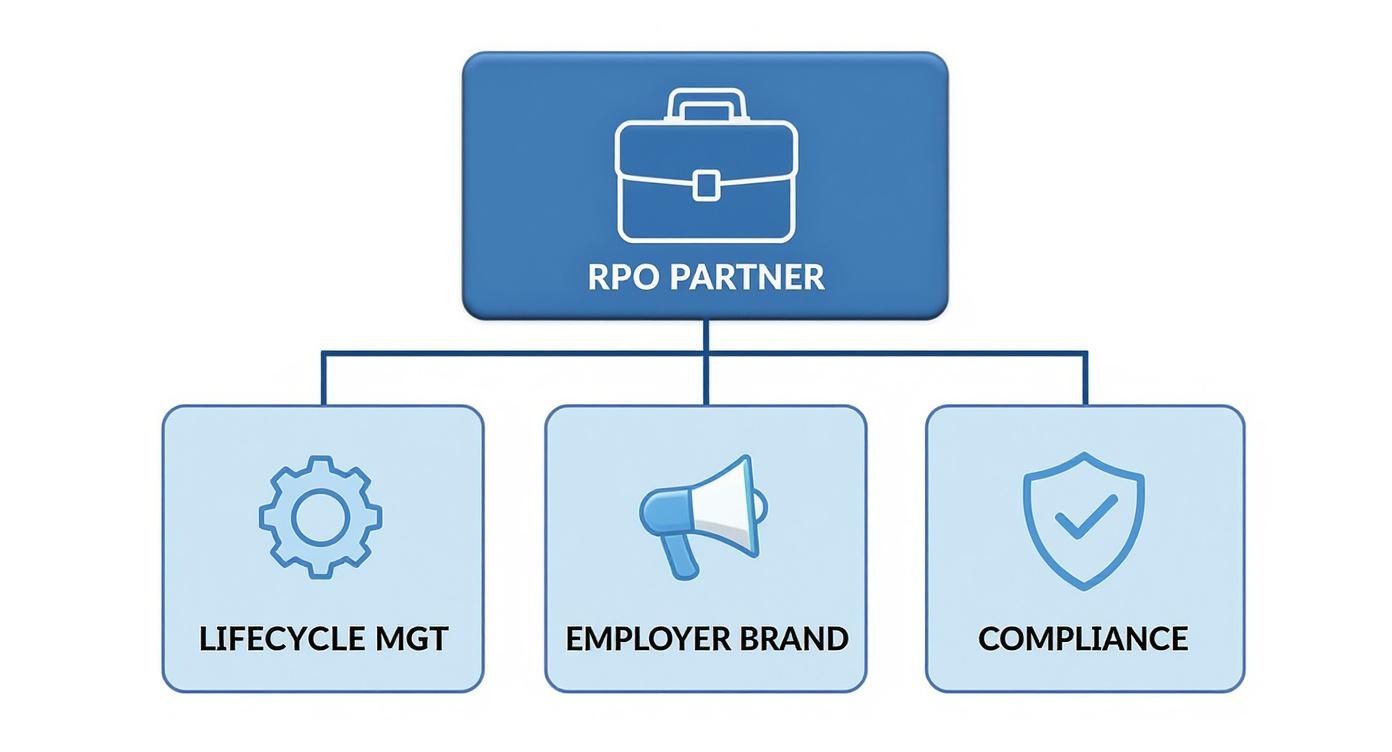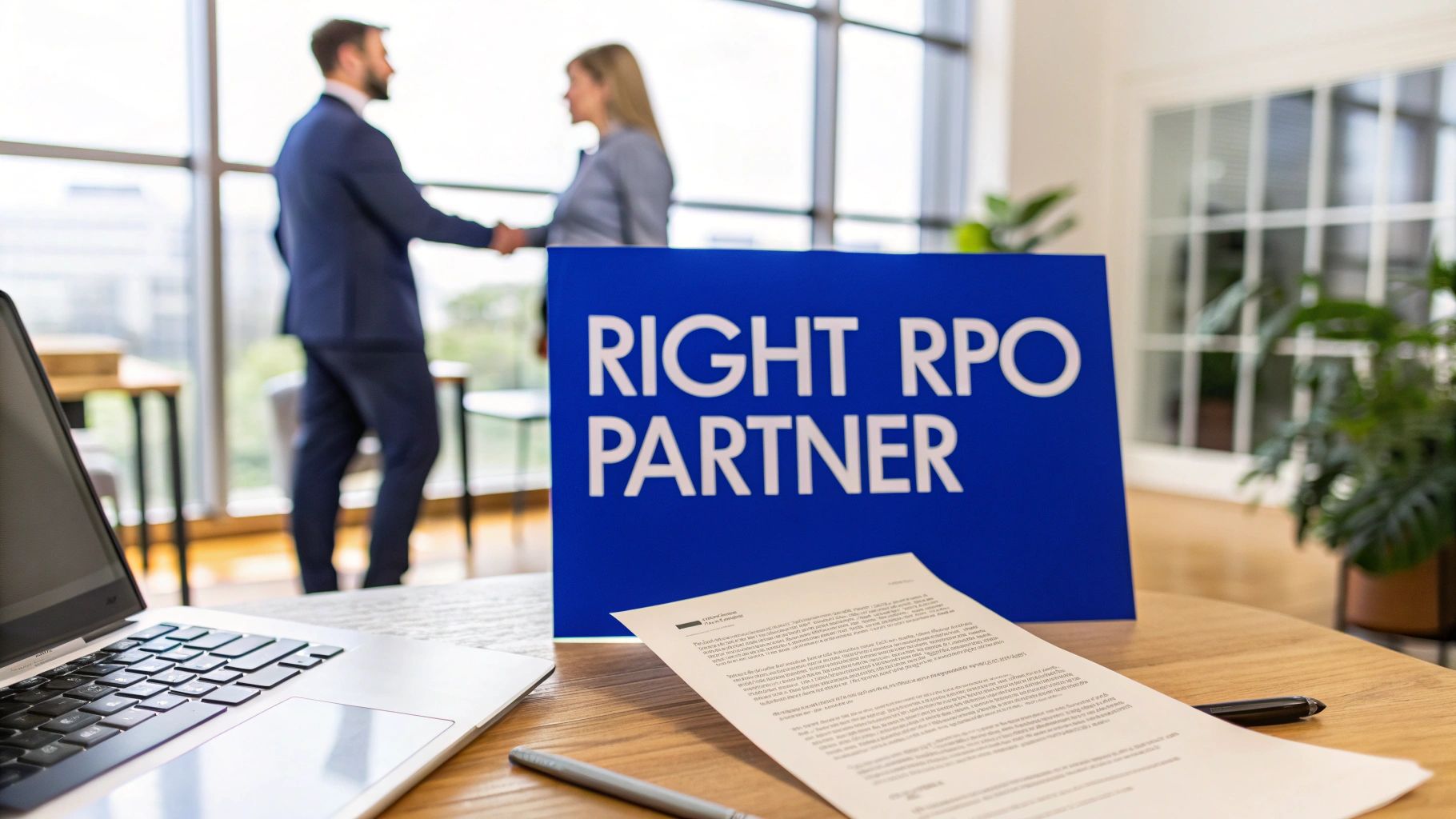Hiring in the UK is tougher than ever. With gaping skills shortages and operational costs on the rise, many businesses are finding their old-school recruitment tactics just aren't cutting it anymore. This is where Recruitment Process Outsourcing (RPO) comes in, not just as a way to save a bit of money, but as a genuine strategic partnership.
Why UK Businesses Now Partner with RPO Companies

The pivot towards RPO is a direct reaction to a difficult hiring market. UK companies are ditching simple, one-off placements and instead looking for embedded partners who can build a talent pipeline that lasts. Imagine finally getting ahead of your hiring needs instead of constantly playing catch-up. That proactive mindset is what really sets true RPO recruitment companies apart from your standard agency.
Let’s look at a real-world example. A fast-growing tech firm is battling to fill dozens of developer roles. Their internal HR team is swamped, the quality of candidates is all over the place, and the time it takes to hire someone is creeping up.
By partnering with an RPO provider, they can offload the entire recruitment lifecycle. The RPO partner will fine-tune job descriptions, source candidates from every corner of the market, and put a rock-solid screening process in place. The result? A faster, higher-quality hiring process.
Addressing the Skills Gap Strategically
For so many UK firms, the real headache is the widening skills gap. The recruitment industry itself, valued at a massive £44.4 billion, tells this story. A striking 65% of employers say finding people with the right skills is their biggest challenge. It's no surprise, then, that nearly half (48%) have turned to outsourced recruitment for help.
But this is about so much more than just filling seats. A smart RPO partnership gives a company the power to:
- Tap into much wider talent pools, including those all-important passive candidates.
- Boost their employer brand to pull in top-tier professionals.
- Let their internal HR team get back to focusing on retention and employee development.
To get the full picture of RPO's strategic edge, it helps to see how businesses are using outsourcing companies in general. When you hand over your recruitment, you're not just delegating tasks; you're importing expertise and efficiency. This is one of the most critical recruitment process outsourcing benefits that companies are now waking up to.
Getting to Grips with Modern RPO Services
So, what do you actually get when you partner with a modern RPO recruitment company? The service goes far beyond just finding people to fill jobs. A genuine RPO provider becomes a part of your business, managing the entire hiring process from the initial job brief right through to onboarding.
This isn't just about outsourcing tasks; it's about handing over ownership. Your RPO partner can launch targeted employer branding campaigns to catch the eye of top talent—even those who aren't actively job hunting. They also get stuck into the essential admin and tech, like managing your Applicant Tracking System (ATS) and making sure every hire is compliant with UK regulations.
Moving from a Quick Fix to a Real Solution
The real difference is the depth of the relationship. A traditional recruitment agency gets paid a fee to fill a specific role. An RPO partner, on the other hand, is invested in making your entire hiring function better for the long haul. That strategic focus is what delivers lasting value, well beyond a one-off placement.
If you'd like to dive deeper into this strategic way of thinking, our guide on what is talent acquisition is a great place to start.
Think about it this way. If you needed to improve your employer brand, a standard agency might suggest a single campaign. An RPO partner will work with you to build a continuous strategy that strengthens your reputation in the market, making it easier to attract great people for years to come.
An RPO doesn’t just work for you; it works as you. It becomes the face of your company to candidates, ensuring a seamless and positive experience that reflects your brand's values at every touchpoint.
Traditional Recruitment vs RPO Partnership
To really see the difference, it helps to put the two models side-by-side. The table below breaks down how a typical agency engagement compares to a strategic RPO partnership. It quickly becomes clear why so many businesses are now opting for the more comprehensive, embedded support that an RPO offers.
Ultimately, it’s a shift from a reactive, fee-for-service model to a proactive partnership designed to deliver sustainable results.
How to Confidently Choose Your RPO Partner
Picking the right RPO partner is one of the most significant decisions you'll make for your workforce. It’s easy to get swayed by a slick sales pitch, but what you really need is a practical way to vet potential providers. The ultimate goal? To find a partner who doesn't just get recruitment, but gets your business on a fundamental level.
Start by digging into their experience within your specific industry. A one-size-fits-all approach just doesn't cut it. A fast-growing tech start-up, for instance, needs an RPO provider that’s nimble and can quickly secure highly specialised talent. On the other hand, a large financial services firm requires a partner who lives and breathes regulatory hiring and compliance. You need proof they've successfully navigated your world, whether that's IT, finance, or manufacturing.
The best RPO partnerships are built on a foundation of shared understanding. Your partner should feel like an extension of your own team, fully immersed in your company culture and aligned with your strategic goals.
Scrutinising Performance and Technology
Once you've established they have relevant industry experience, it’s time to talk about data and transparency. Don't be shy about asking potential RPO recruitment companies for hard numbers and detailed performance metrics from past clients. You need to see tangible evidence of their success, not just hear them talk about it.
Get straight to the point with questions like:
- What’s your average time-to-fill for roles like the ones we're hiring for?
- How do you actually measure quality-of-hire, and what do your retention stats look like?
- Could you share some sample reports so we can see your analytics in action?
An RPO’s effectiveness is often tied directly to its technology. They should be well-versed in modern Applicant Tracking Systems (ATS) and other recruitment tools that can integrate seamlessly with the systems you already use. For more tips on building these kinds of effective collaborations, check out our guide on how to work with recruitment agencies.
This infographic gives a great overview of the core services a strong RPO partner should be handling for you.

As you can see, a true partner does much more than just fill seats. They manage the entire talent lifecycle, protect your employer brand, and handle critical compliance issues. At the end of the day, choosing an RPO provider is about finding a strategic ally who can offer local expertise with a global perspective, ensuring every hire is a good fit both for the role and your company culture.
Navigating the Common RPO Implementation Hurdles
Bringing an RPO provider into the fold is a huge operational step, and let’s be honest, it’s not always a completely smooth ride. It pays to have your eyes open to the potential bumps in the road before you hit them.
One of the biggest obstacles I've seen time and again is purely internal: the fear of losing control. Your hiring managers might be nervous that an outside partner just won't 'get' the subtleties of your company culture or the specific needs of their teams.
And you know what? It’s a perfectly reasonable concern. The only way to get past it is to treat your RPO provider not as a supplier, but as a genuine extension of your own team. This means fostering open, constant communication and making sure everyone is pulling in the same direction from day one.
Setting the Foundation for a Strong Partnership
To sidestep most of the common frustrations, you need to define expectations with crystal clarity. Assumptions are the enemy here. Your Service Level Agreement (SLA) has to be more than a formality; it needs to be a detailed roadmap with key performance indicators (KPIs) that actually mean something to your business.
So, what does that look like in the real world?
- Instead of a vague goal like "improve candidate quality," get specific.
- A much better target would be something like, "reduce new hire turnover in the first six months by 15%."
This simple shift changes everything. It gives you a solid benchmark for success and makes your RPO partner truly accountable for delivering results that matter.
The strength of an RPO partnership is directly tied to the quality of its setup. A well-defined SLA and open communication channels transform potential conflicts into opportunities for collaboration and process improvement.
Getting this strategic alignment right is crucial, especially now. The UK recruitment sector, valued at around £43 billion, is grappling with persistent talent shortages and squeezed margins. With nearly half of firms feeling pessimistic about what's ahead, RPO recruitment companies offer a lifeline—a structured way to manage the chaos.
You can get a deeper look into the challenges and opportunities from the UK recruitment sector on Saffery.com. By planning for the hurdles from the outset, you’re not just hiring a service; you’re building a resilient and effective talent partnership.
Gauging the Real Return on Your RPO Partnership

So, you've partnered with an RPO provider. How do you know it's actually paying off? Ticking off filled vacancies is one thing, but that’s a superficial view. The real test is seeing recruitment not as a line item on a budget, but as a core engine for your company's growth.
This requires a shift in perspective. You need to look past the surface-level numbers to the metrics that show genuine, lasting impact. To truly grasp the value your RPO partner brings, you have to measure what matters. This guide on 8 Essential Recruitment KPIs to Track in 2025 is a brilliant starting point for assessing performance and making smarter decisions.
Moving Beyond Cost-Per-Hire
Of course, metrics like cost-per-hire and time-to-hire are useful for gauging efficiency. But the one metric that trumps them all is quality-of-hire. This isn't a single, clean number you can just pull from a spreadsheet; it's a narrative that unfolds over time, pieced together from various data points.
So how do you actually measure it? I've always found the best way is to track a combination of factors:
- Performance Reviews: Take a look at the first-year performance reviews. How do the candidates sourced by your RPO partner stack up against those hired through other channels?
- Retention Rates: Are the people they find sticking around? High retention is one of the strongest indicators of a good match, both for the role and the company culture.
- Hiring Manager Satisfaction: This is crucial. Are your team leaders happy with the new hires and the support they received during the process? Their feedback is gold.
These less tangible wins are where the real value often lies. When you see your candidate satisfaction scores climb or notice a stronger employer brand in the market, you know the partnership is working. This is the difference great RPO recruitment companies make.
The true ROI of an RPO partnership emerges when it not only fills roles quickly but also elevates your talent quality, polishes your brand reputation, and underpins the long-term stability of your business.
By focusing on these deeper metrics, you can build a compelling case that shows stakeholders exactly how the partnership is delivering strategic, not just operational, value.
Got Questions About RPO? We've Got Answers
When businesses first start looking into recruitment process outsourcing, a few questions nearly always pop up. Getting straight answers is the only way to figure out if an RPO partnership is genuinely the right move for your company.
Let's start with the most common one: what's the real difference between RPO and a standard recruitment agency? It’s simple, really. A recruitment agency is transactional. You have a gap to fill, they find a person, you pay a fee. An RPO provider, on the other hand, embeds themselves into your business, taking ownership of your entire recruitment function, or a part of it, as a true extension of your team.
Is RPO Just for the Big Players?
This is a myth I hear all the time. While it's true that huge corporations have used RPO for years to handle massive hiring volumes, the game has changed. Today's RPO providers are far more flexible, offering scalable models that are perfect for SMEs.
Think about project-based RPO, for example. It allows smaller companies to bring in elite-level recruitment expertise for a specific hiring push or a critical project. You get all the benefits without being locked into a massive, long-term contract. It’s an incredibly smart way to scale your hiring power exactly when you need it.
It all comes down to the mindset. A staffing agency gives you a candidate for a role. An RPO partner builds and refines your entire hiring process for sustained success. You're not just buying a service; you're gaining a strategic partner.
How Is RPO Priced in the UK?
There’s no single price tag for RPO in the UK, as the cost is shaped by what you actually need. Most pricing structures, however, fit into a few common categories.
- Cost-per-hire: A straightforward model where you pay a fixed fee for each person successfully hired.
- Monthly management fee: This is a set monthly cost for the ongoing management of your recruitment process.
- Hybrid model: Often the most popular, this blends a management fee with performance-based bonuses tied to specific results.
Ultimately, the final figure will come down to the scope of the work, the number of hires you need to make, and how complex those roles are.

